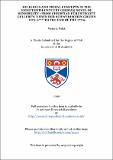Files in this item
Religious and moral concepts in the eighteenth-century German novel of sensibility : from Christian Fürchtegott Gellert's 'Leben der schwedischen Gräfin von G+' to the end of the 1770s
Item metadata
| dc.contributor.advisor | Williams, John R. Williams | |
| dc.contributor.author | Polak, Victoria | |
| dc.coverage.spatial | 265 p. | en_US |
| dc.date.accessioned | 2018-05-18T10:25:34Z | |
| dc.date.available | 2018-05-18T10:25:34Z | |
| dc.date.issued | 1990-07 | |
| dc.identifier.uri | https://hdl.handle.net/10023/13391 | |
| dc.description.abstract | In my introduction I analyse the state of research in my subject. No detailed study of the subject has been conducted in recent years, hence there exists no work which takes account of recent conclusions in the examination of Sensibility in its entirety. I, therefore, consider it important to trace the origins of a movement in European culture. I draw attention to possible influences from philosophy and psychology which have tended to be neglected in favour of too exclusive emphasis on Empfindsamkeit as secularised Pietism. The main part of my thesis is devoted to detailed interpretation of five novels covering a period 1747 to 1776. This study yields various conclusions. In the novel as a genre, as in theoretical works on Empfindsamkeit, there is no polarity between the Enlightenment and Sensibility. Each of the novelists analysed is concerned to proclaim the necessity of achieving a balance between reason and emotion. In the novels of Gellert and La Roche this is explicitly stated in the form of moral instruction to the reader, while the fate of the heroes of Goethe and Miller perhaps suggests indirectly that such an equilibrium might be desirable. In particular the earlier authors I study equate moderation in feeling with virtue. Here these novelists advocate only feeling in the cause of virtue, while at the same time arguing that those who are capable of "true feeling" are by definition virtuous. In the sphere of religion, all novelists show a tendency to regard Christianity as a matter of emotion on the one hand and of practical ethics on the other. While there was a shift in emphasis from Tugendempfindsamkeit to the cultivation of feeling for its own sake, perceptions of the nature of religions and virtue remained constant. | en_US |
| dc.language.iso | en | en_US |
| dc.publisher | University of St Andrews | |
| dc.subject.lcc | PT759.S3P7 | en |
| dc.subject.lcsh | German literature--18th century--History and criticism. | en |
| dc.title | Religious and moral concepts in the eighteenth-century German novel of sensibility : from Christian Fürchtegott Gellert's 'Leben der schwedischen Gräfin von G+' to the end of the 1770s | en_US |
| dc.type | Thesis | en_US |
| dc.type.qualificationlevel | Doctoral | en_US |
| dc.type.qualificationname | PhD Doctor of Philosophy | en_US |
| dc.publisher.institution | The University of St Andrews | en_US |
This item appears in the following Collection(s)
Items in the St Andrews Research Repository are protected by copyright, with all rights reserved, unless otherwise indicated.

